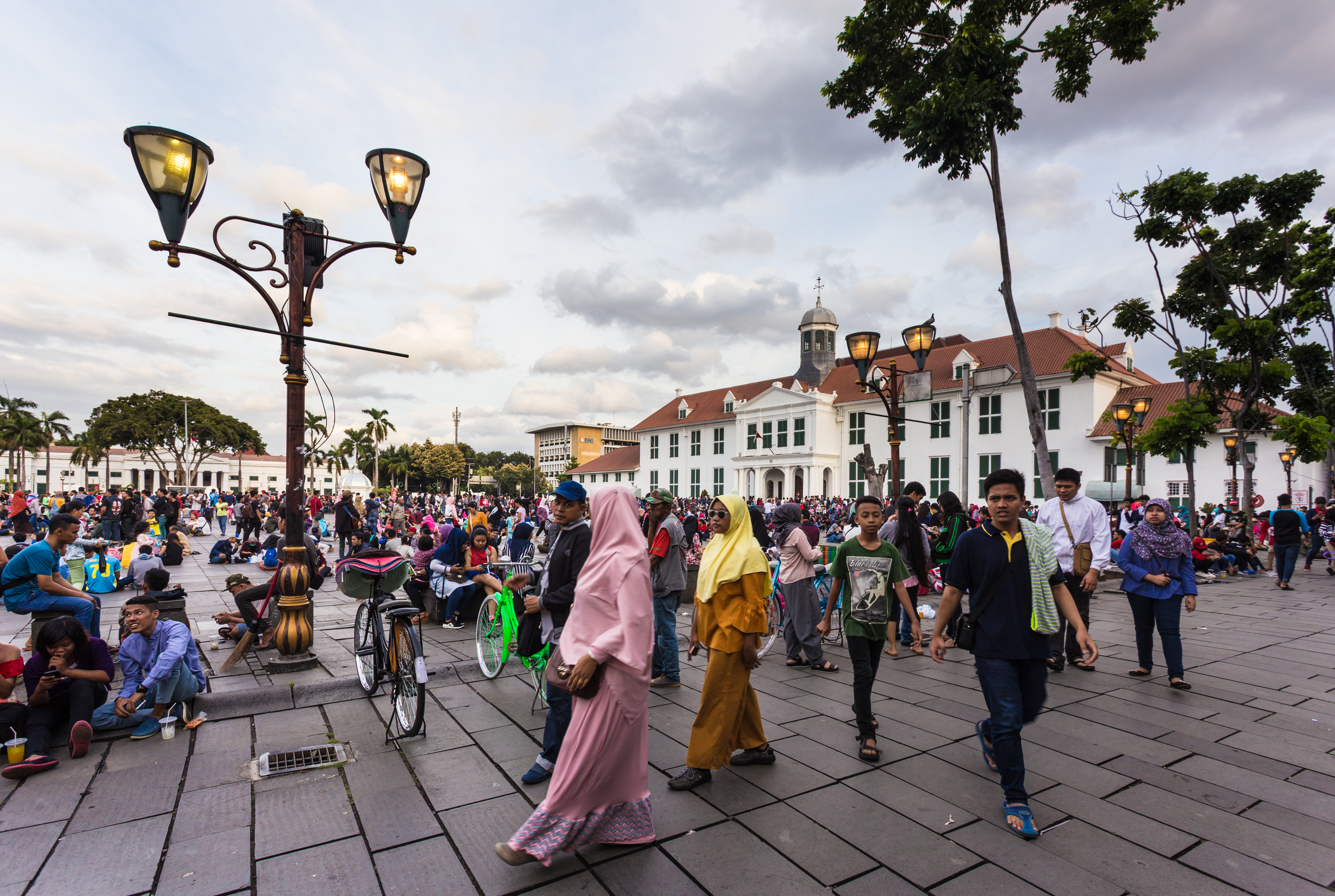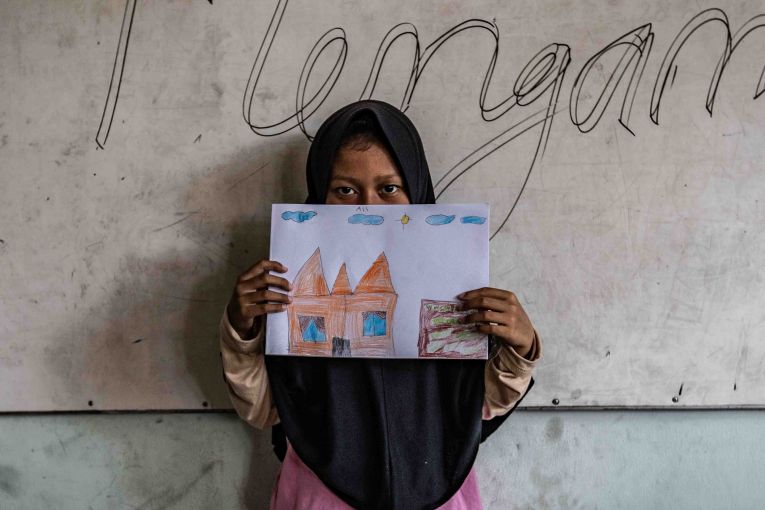
The group of children busily drawing in a classroom in Jakarta represent Indonesia's response to a new problem facing the country: how to counter the indoctrination of entire families in violent extremist ideology.
One 10-year-old girl draws blue clouds hovering over a house with a bright orange roof. A boy, 17, draws a ship with an Indonesian flag. Another girl, 16, smiles as her best friend draws their names together in calligraphy.
Eight of the 10 children in the class are the surviving members of the families that carried out a string of ISIS-inspired suicide attacks in the city of Surabaya in May 2018.
One girl, who was 8 at the time, was thrown clear by the force of the blast as her parents bombed a police station, killing themselves and her brothers. Three other children survived when a bomb exploded prematurely in the apartment they were occupying. Their mother and one of their siblings died, while their father was shot dead by police who arrived at the scene.
The drawing class is part of a government-run special programme for these children who, together with other minors suspected of terrorism or other crimes live at a government shelter under the care of social workers and psychologists.
Besides regular lessons, their days are filled with counselling, prayer and play sessions combined with classes on nationalism and respect for different beliefs.
The identity of the children as well as the location of the shelter is kept secret to protect them from ISIS sympathisers.
"The children were very traumatised by what happened. They were withdrawn. They did not talk to us social workers or mix with other children," said Neneng Heryani, who heads the shelter under the auspices of Indonesia's Social Affairs Ministry.
Some of the children's parents did not allow them to go to school and forbade them from playing with other children. Instead, they taught them about martyrdom and the importance of suicide bombings. In one case, bedtime involved watching violent extremist videos, according to Ms Heryani.
"Their parents taught them that jihad is the path to heaven. It's very hard to change this way of thinking. We cannot speak ill of their parents, they are still their parents," Ms Heryani said.
Sustriana Saragih, a psychologist, has worked with the children, conducting regular interviews, psychological tests and play therapy.
Initially, when the children were given toy soldiers, cooking sets and miniature animals during play therapy, they always chose the toy soldiers and acted out shooting and stabbing scenes, she said.
This slowly changed. "They were still playing with toy soldiers, but they were no longer fighting. The soldiers were gathered around in a circle. The children said they were gathering for the funeral of their parents," Ms Saragih said.
In some play sessions, one soldier or animal was set apart from the others. The children said the solitary figure represented them, and how they were now alone.
"As children, they did not question their parents' teachings, they simply internalised it. They are victims who did not choose the families they were born into," Ms Saragih said. "They need to be shown an alternative way of thinking. They need be shown love and acceptance."
The Surabaya attacks came as Indonesia was already struggling with the return of hundreds of Indonesian ISIS fighters and sympathisers, many with their families, after the collapse of the group's territory in Syria and Iraq.
The nationwide horror at children being used as suicide bombers turned the spotlight on how ISIS has turned its violent cause into a family affair. President Joko Widodo pressured parliament to approve changes to counter-terrorism law to strengthen surveillance mechanisms and extend pre-trial detention periods for suspects. A massive round-up of suspected terrorists also followed.
According to a report by the Institute for the Policy Analysis of Conflict (IPAC), a think tank in Jakarta, the belief that the end of the world was coming, a theory popularised in extremist circles, was the main motivation for the Surabaya bombings. "The families had to have their access to heaven guaranteed immediately," said IPAC director Sidney Jones.
Mohammad Adhe Bhakti, director of the Centre for Radicalism and Deradicalisation, said of Dita Oepriarto, the alleged mastermind of the attacks who died along with his wife and four children: "He knew he was going to die. Maybe he did not want to leave his children behind, afraid they would be abandoned by the community or the state."
Experts say that deradicalisation programmes now have to address how families can be persuaded to change their mindset, both as individuals and as a family.
"ISIS is the first global jihadist organisation that distributed propaganda appealing to families. Social media had a lot to do with that. You can't go back to the old model of deradicalisation targeted only at males," said Ms Jones.
"The main lesson of the Surabaya bombings is not that the use of children is the new modus operandi. It is that defeat of ISIS in the Middle East have emboldened – rather than discouraged – ISIS supporters to wage war at home."
The Indonesian government is stepping up its counter-terrorism efforts to focus on prevention through national education programmes.
The National Agency for Combating Terrorism conducts counter-terrorism seminars across Indonesia to teach communities to act as early warning systems by spotting signs of radicalisation online.
The agency is also working on a Counter Terrorism National Action Plan with a strong focus on making terrorism prevention part of educational programmes.
More than a year later, the children of the Surabaya attackers show signs of being ready to leave their past lives behind.
"They act like normal children now. They even like eating pizza and KFC," said Ms Saragih. Previously the children saw fast food as a symbol of western ideals and refused to eat it.
But this raises fresh questions, as it is difficult to convince others that the children do not pose a threat. The Surabaya community is reluctant to take them back, and relatives are afraid of being labelled terrorists if they take care of the children.
A nurturing environment is essential to shield the children from the isolation that may again push them towards radicalisation. Local governments must be prepared to monitor the progress of the children. In the absence of this, the future of the children remains uncertain, said Ms Heryani.
The government is exploring the possibility of enrolling the children in Islamic boarding schools they can work with, but there are no easy answers.
"These are very special children put in a very difficult situation," said Ms Heryani, social affairs ministry head.












